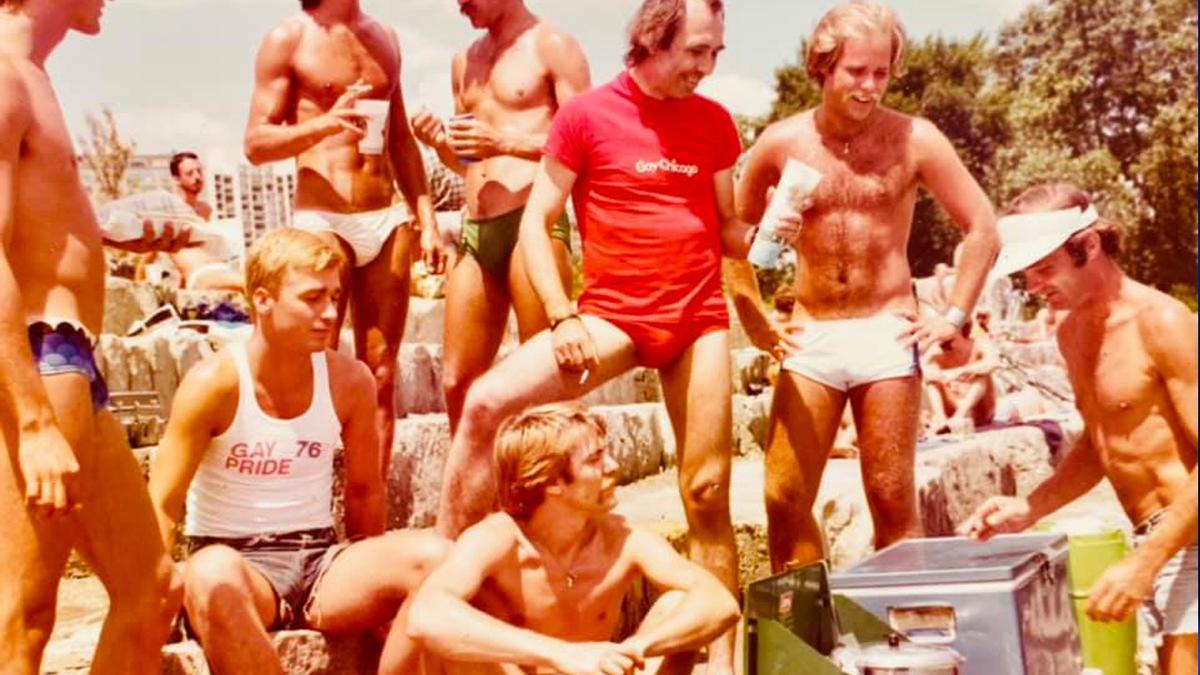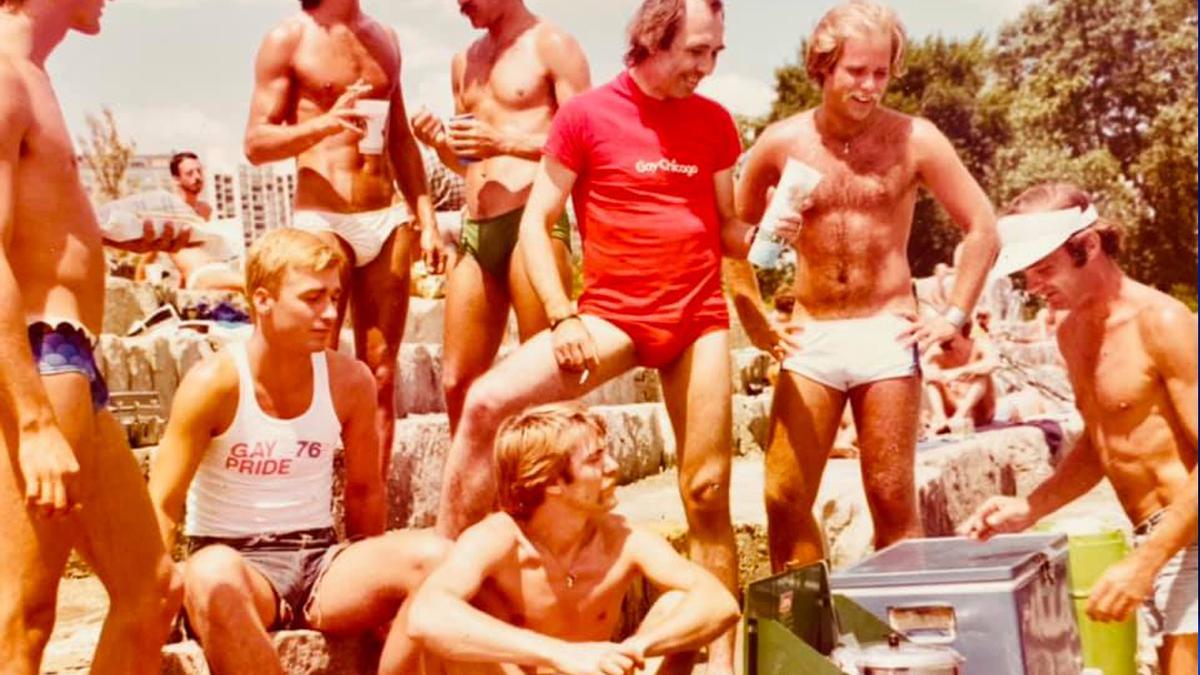The significance of the Belmont Rocks in Chicago's LGBTQ history
Sat. June 10, 2023 1:17 PM by Ross Forman

the belmont rocks provided a safe gathering space
photo credit // gay chicago archives/the legacy project
The Belmont Rocks carry ‘an important place in Chicago LGBTQ history,’ says historian Owen Keehnen
A trip down memory lane, specifically, Chicago’s LGBTQ history, is set for Monday, June 12. The Belmont Rocks: A Talk With Owen Keehnen delivers a journey back in time as the noted Chicago writer and historian discusses the importance and evolution of the Belmont Rocks, a gathering place for LGBTQ Chicagoans from about 1960 until their demolition in 2003.
Keehnen, a renowned local activist and member of the Chicago LGBT Hall of Fame, will share personal tales and more of the gathering place for LGBTQ Chicago, particularly gay men, located between Diversey and Belmont Harbor along the lakefront and east of the bike path. Where The Rocks once sat is now home to AIDS Garden Chicago.
The Belmont Rocks carry “an important place in Chicago LGBTQ history,” said Keehnen, who long worked at Unabridged Books.
The Rocks, he added, “was an area that LGBT Chicagoans kind of claimed for their own for decades.”
Ironically, Keehnen said the how, of how the Belmont Rocks became an LGBT hotspot some 60-plus years ago is not clear. “It just sort of happened organically,” he said. “(It) probably (was) because of its proximity to a dense gay population (in the) Lakeview and Lincoln Park,” neighborhoods of Chicago.
“The Rocks themselves were kind of advantageous because they were in the middle of things but, at the same time, they were somewhat removed. So, they couldn’t be easily raided; it would be pretty easy to see someone approaching,” Keehnen said.
The Belmont Rocks were bulldozed in 2003 to prevent erosion along the lakefront.
In 2018, AIDS Garden Chicago opened.
Keehnen’s event on June 12 will include a slideshow, talking about the importance of The Rocks, their history, their development, the different things they meant to different people, some of the artwork that was on the rocks, the artwork that they inspired, and more.
Keehnen said he visited The Rocks from 1984-95, and still cycles by the area nowadays.
The Belmont Rocks “were a queer space that, to me, define the meaning of community,” he said. “When I think of The Belmont Rocks, I think of it as symbolic of this community that has really had my back, and a lot of people’s backs for a lot of years.
“I met so many people at the Belmont Rocks. They were just a really nice place to hang out with friends,” and there often were cookouts, group meetings and more. “They were just a nice place to go (to), especially on a sunny day, to hang out with friends.
“You never knew who was going to show up,” at The Rocks.
The Rocks were an ongoing meet & greet destination, he said.
And of course, there was a lot of cruising at The Rocks.
At the AIDS Garden Chicago, there is seating that is the original Belmont Rocks.
“Imagine yourself (living) in a Don’t Say Gay State, where you could not gather, but, you found a secret place where you could (gather), where you could be free with friends. That place would be really important to you – and that’s what the Belmont Rocks were,” Keehnen said. “The AIDS Garden Chicago is the recognition that this place, The Belmont Rocks, did have a significance.
“The main thing is to remember what they were and their important place in our history.
“Young people today, they are so interested in queer history, really interested. That’s really heartening. They are very eager to learn history,” such as what were the Belmont Rocks.
Keehnen is emotion-filled when talking about the Belmont Rocks. “There’s no being there now without being there then,” he said. “The Belmont Rocks were an important place that feels significant to me, and I hope others see the significance of The Rocks, too.
“The Rocks were not largely reported on or documented. So, a lot of their importance relies on the importance they had on people’s lives.”
Keehnen’s presentation will be an immersive experience, he said. “I want people to feel what it was like to be there.”
The Rocks drew a mixed demographics, he said, and the area was packed on popular, sun-drenched weekends, such as Memorial Day.
Chicago's Pride Month calendar is on GoPride.com
Keehnen, a renowned local activist and member of the Chicago LGBT Hall of Fame, will share personal tales and more of the gathering place for LGBTQ Chicago, particularly gay men, located between Diversey and Belmont Harbor along the lakefront and east of the bike path. Where The Rocks once sat is now home to AIDS Garden Chicago.
The Belmont Rocks carry “an important place in Chicago LGBTQ history,” said Keehnen, who long worked at Unabridged Books.
The Rocks, he added, “was an area that LGBT Chicagoans kind of claimed for their own for decades.”
Ironically, Keehnen said the how, of how the Belmont Rocks became an LGBT hotspot some 60-plus years ago is not clear. “It just sort of happened organically,” he said. “(It) probably (was) because of its proximity to a dense gay population (in the) Lakeview and Lincoln Park,” neighborhoods of Chicago.
“The Rocks themselves were kind of advantageous because they were in the middle of things but, at the same time, they were somewhat removed. So, they couldn’t be easily raided; it would be pretty easy to see someone approaching,” Keehnen said.
The Belmont Rocks were bulldozed in 2003 to prevent erosion along the lakefront.
In 2018, AIDS Garden Chicago opened.
Keehnen’s event on June 12 will include a slideshow, talking about the importance of The Rocks, their history, their development, the different things they meant to different people, some of the artwork that was on the rocks, the artwork that they inspired, and more.
Keehnen said he visited The Rocks from 1984-95, and still cycles by the area nowadays.
The Belmont Rocks “were a queer space that, to me, define the meaning of community,” he said. “When I think of The Belmont Rocks, I think of it as symbolic of this community that has really had my back, and a lot of people’s backs for a lot of years.
“I met so many people at the Belmont Rocks. They were just a really nice place to hang out with friends,” and there often were cookouts, group meetings and more. “They were just a nice place to go (to), especially on a sunny day, to hang out with friends.
“You never knew who was going to show up,” at The Rocks.
The Rocks were an ongoing meet & greet destination, he said.
And of course, there was a lot of cruising at The Rocks.
At the AIDS Garden Chicago, there is seating that is the original Belmont Rocks.
“Imagine yourself (living) in a Don’t Say Gay State, where you could not gather, but, you found a secret place where you could (gather), where you could be free with friends. That place would be really important to you – and that’s what the Belmont Rocks were,” Keehnen said. “The AIDS Garden Chicago is the recognition that this place, The Belmont Rocks, did have a significance.
“The main thing is to remember what they were and their important place in our history.
“Young people today, they are so interested in queer history, really interested. That’s really heartening. They are very eager to learn history,” such as what were the Belmont Rocks.
Keehnen is emotion-filled when talking about the Belmont Rocks. “There’s no being there now without being there then,” he said. “The Belmont Rocks were an important place that feels significant to me, and I hope others see the significance of The Rocks, too.
“The Rocks were not largely reported on or documented. So, a lot of their importance relies on the importance they had on people’s lives.”
Keehnen’s presentation will be an immersive experience, he said. “I want people to feel what it was like to be there.”
The Rocks drew a mixed demographics, he said, and the area was packed on popular, sun-drenched weekends, such as Memorial Day.
Chicago's Pride Month calendar is on GoPride.com






